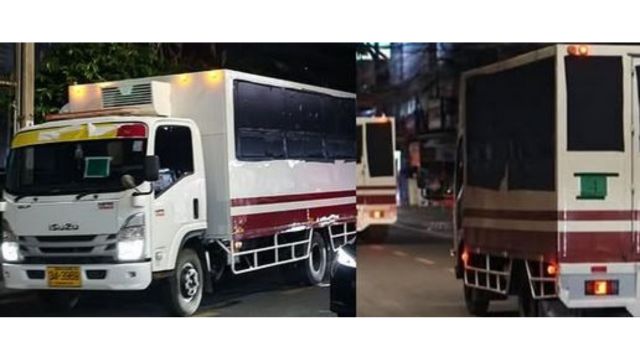FILE- This photo shows an immigration detention center where Uyghur detainees were held in Bangkok, Thailand, Saturday, Jan. 11, 2025. (AP Photo/Haruka Nuga, File)
Now, the Thai government is dealing with the fallout of a move that outraged human right activists and allies. The decision is at the heart of Thai parliamentary inquiries and a diplomatic rift between Thailand and its biggest military ally. The United States has imposed sanctions on multiple Thai officials while the European Union and other allies issued condemnations.
Thai officials visited Xinjiang last week to meet some of the deported Uyghurs and said they are being treated well. They have also said the men returned voluntarily, despite evidence to the contrary.
Thailand’s dilemma
Members of the East Turkistan National Awakening Movement protest China’s treatment of Uyghurs, near the State Department, on Dec. 22, 2021, in Washington. (AP Photo/Alex Brandon, File)
The Uyghurs are a Turkic, majority Muslim ethnicity native to Xinjiang. After decades of conflict over suppression of their cultural identity, Beijing launched a brutal crackdown on the Uyghurs that some Western governments deem a genocide.
The men deported last month were part of a larger group of Uyghurs detained in Thailand in 2014 after fleeing China. That left Thailand facing competing demands from Beijing and Washington.
Beijing said the Uyghurs were terrorists and wanted them sent back, but hasn’t presented evidence. Uyghur activists and Western officials said the men are innocent and have urged their resettlement elsewhere.
Facing potential backlash from all sides, Thailand kept the men in detention for over a decade.
That changed when Thai Prime Minister Paetongtarn Shinawatra took office last year. Her father, former Prime Minister Thaksin Shinawatra, has close links to top Chinese officials.
HOLD- FILE- In this photo released by the Thailand’s Government Spokesman Office, Chinese President Xi Jinping, right, shakes hands with Thailand’s Prime Minister Paetongtarn Shinawatra in Beijing, China, Thursday, Feb. 6, 2025. (Thailand’s Government Spokesman Office via AP, File)
Thai officials began secretly discussing plans to deport the Uyghurs as early as December, a month after Paetongtarn met Chinese leader Xi Jinping, the AP earlier reported.
China sent a formal request to repatriate the Uyghurs on Jan. 8, according to records of a parliamentary inquiry held after the men had been sent back and lawmaker Rangsiman Rome.
The same day, the men were asked to sign deportation papers, alarming them. They made a public appeal and went on a hunger strike, giving pause to Thai officials.
Nonetheless, on Jan. 17, the National Security Council decided behind closed doors to deport the Uyghur detainees at a meeting attended by the ministers of defense and justice, the council’s Secretary-General Chatchai Bangchuad revealed to the parliamentary investigation. Chatchai said the decision was based in part on commitments from China that the men would be treated well and that Thailand would be allowed to check on them.

